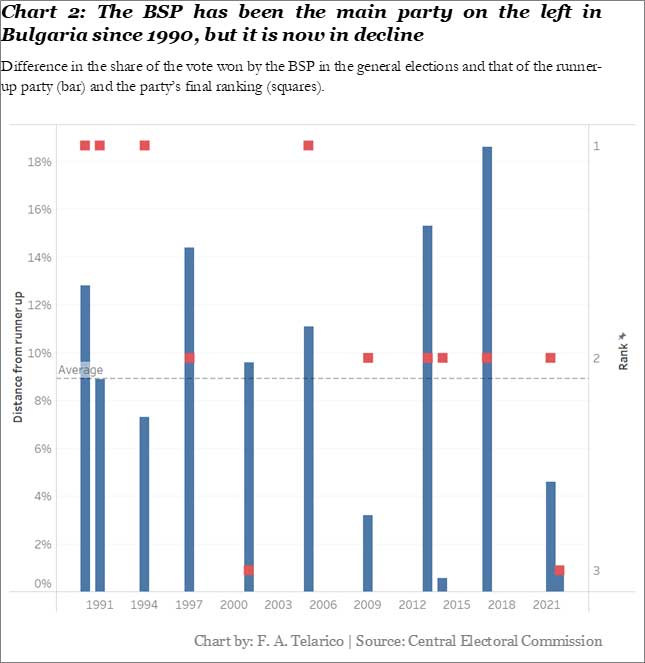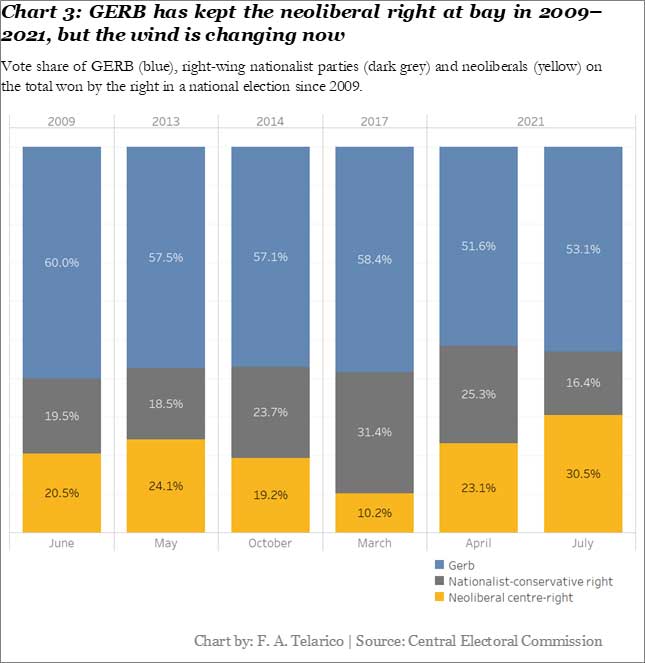In the last few years, Eastern European politics has hit the headlines around the world rather often. However, commentaries on the topic have been everything but flattering — and not without reason. Usually, journalists and politicians lament the ‘democratic backsliding’ affecting the region and the lack of Western-minded leaders. But the fluid political situation in Bulgaria seems to offer a first chance for neo-liberal elites to strike back. Will it really happen?
The laments of the (neo)liberal media — Introduction
Since the 2010s, several commentators in the US and Europe have suddenly become experts on Eastern Europe writing bitter pieces. Usually, the region hits the headlines only due to the surreptitious regime change still undergoing in Poland and Hungary. Namely, commentators posit the likes of Orban and Kaczyński as dictators forgetting that most voters supports them (Figure 1). Meanwhile, few remind that the European Union is also to blame for the region’s growing unacceptance of the ‘liberal’ values. For instance, the region’s underrepresentation in EU institutions does “severely undermine support for the EU‘s institutions, values and policies”. But most of these ‘experts’ prefer to focus on how “populist” leaderships are making Budapest and Warsaw “worse” than Brexit. Rarely do they emphasise the many “fragile spots that require further discussion on multiple levels” in Eastern Europe’s post-socialist democracies.

Actually, the simple truth is that these attacks stem from a clear ideological agenda — which some reproduce unwittingly. In the end, those who demonise Eastern European leaders for their “machoistic” attitude are simply sorrow losers. In fact, they echo local neoliberal elites’ lamentations for their inability to harness consensus (Chart 1).
Neoliberals’ comeback — Is Hungary an exception?
However, despite non-trivial differences amongst anti-government formations, a united ‘opposition’ bloc in taking shape in some illiberal Eastern European democracies. Interestingly, this strategy may yield the first concrete, positive results where illiberalism is at its apogee: Hungary. As to “put an end” to Orban’s rule, social-democrats, centrists and other neoliberals have agree to put their “differences aside”. So much so, that this rainbow coalition including six Hungarian parties is celebrating its primary at the time of writing. As of now, they are likely to select Budapest’s liberal-green mayor as their joint candidate to the prime ministership. Few people would make a starker contrast to the Orban and his strong appeal to rural constituencies. But Hungary is an almost unique case. Besides rigging the economic game in favour of its allies, Orban has rewritten the constitution making it much more ‘illiberal’.
Hence, the wind of history seems to be changing direction, at least in Hungary. But illiberal leaders in the rest of Eastern Europe have had a less spectacular and more recent success than Orban. Especially in those countries that are members of the EU such as Poland, Slovenia, Czechia, and Bulgaria. For instance, many criticise the Slovenian Prime Minister for having “repeatedly and publicly attacked the country’s” main public media outlets.” Whilst Poland’s Constitutional Tribunal face strenuous condemnations for considering EU law’ subordination to the constitution and its politicisation. Whereas, the exact same things have happened in Hungary without anyone complaining about it. Thus, expectations of a weaker and slower rejoinder are only natural.
The second piece of the puzzle: Bulgaria
Against this background, the transformations of the Bulgarian centre-right acquire a completely new meaning and a much more far-reaching significance. In fact, neo-liberal elites seem intent to exploit the pandemic-induced crisis to hold on power beyond Hungary as well. Apparently, the first stepping stone in this process of ‘reconquest’ of the region will be Bulgaria. After all, the protracted institutional crisis the country is facing grants immense potentiality for emerging new leaders advocating for radical changes. For a while now, neoliberal forces are on the verge of allying with left-leaning parties in the upcoming election. Perhaps, this almost-cohesive coalition will manage to form a stable government after three consecutive snap elections in early 2022.
Therefore, it is worth giving more attention to what exactly is happening in Bulgarian power politics. Namely, to identify which leaders are on the rise, what agenda do the advance and what their vested interests are.
The shrinking left opposition
Since the auto-golpe of the Communist Party in the 1990s, fair and competitive elections have taken place regularly in Bulgaria. At the first few democratic election of their life, voters lent the victory to the former-communist Bulgarian Social Party (BSP). Notably, unlike the German SPD and other Western-European socialists and social-democrats, the BSP’s agenda combines social conservatism and economic interventionism. Actually, since the devasting hyperinflation of winter 1996–1997, the BSP has managed to win only one lection, in 2005. Nevertheless, the party remains the main political force of the traditional left floating between 15% and 25% of the votes. Thus, the BSP and its leftmost fractions have represented the only real opposition to Prime Minister Boyko Borisov since 2009.

Or they did until April 2021, when the party ranked third in the general elections for the second time ever. Then, the party barely avoided slipping to the fourth place at the snap elections in July 2021, a colossal debacle. However, the BSP’s lost votes have not migrated compactly to another leftist party. In fact, the only likeminded list on the left, ISNI, gathered just around 5% of all votes in July. Hence, the Bulgarian left of the centre has shrunk to no more than 18% of the electorate. In order to find out where did these votes go one needs to look what is happening on the right. In fact, the socially and economically liberal right of the centre seems to have been thriving during the pandemic.
The centre-right between feckless populism …
The Bulgarian centre-right has been quite effervescent ever since the end of real socialism. Not least because the anti-systemic bloc exploded in a myriad of smaller fraction earlier than elsewhere in Eastern Europe. To be exact, the anti-communist coalition called Union of Democratic Forces (UDF) lost its hegemony as early as 2001. Subsequently, the UDF won slightly less than 9% of the vote in 2005 before disappearing from the electoral maps. In less than a decade, the Bulgarian centre of the right moved beyond the UDF and its irrelevant successor parties. So Boyko Borisov, the populist mayor of Sofia, took the helm of this political segment with his personal party, GERB. From 2009 and until 2021, the party has won commanding majorities of the popular vote (Figure 3). Thus, GERB has long dominated the Bulgarian centre-right as a whole forcing smaller parties to accept its overreaching patronage.

This equilibrium tuned unstable in 2020, when Democratic Bulgaria (DB), a coalition of neoliberal parties, gained massive prominence. Thank to a mostly favourable coverage on many opposition media, DB rallied many of those Borisov’s long tenure had disillusioned. Namely, at the latest election it gathered about 12% of the preferences, ranking close fourth behind the BSP. Clearly, in doing so DB became GERB’s number one adversary ‘officially’. But last month, DB has proved its decisivenss for the formation of any government; making it a kingmaker of sorts.
… and neoliberal elitism
But the story does not end of the story for Bulgaria’s neoliberal elites. In fact, this camp has a new rising leader: Kiril Petkov, former caretaker finance minister between May and August 2021. Actually, Petkov was a complete novice in politicking before his presidential appointment to a cabinet-ranking post a few months ago. However, he has learnt rather quickly how to hide his secrets behind a thick smoke courtain or counter-allegations and dissimulation. Most recently, he has proved these new skills during the ‘affaire’ concerning his alleged – then ascertained – double citizenship. In fact, Bulgarian ministers cannot hold any other citizenship by law; but Petkov was a Canadian national until April 21. Still, he did not disclose the renounciation to his Canadian citizenship until some parlamentarians raised the issue publicly. Eventually, Pertkov managed to get out of the woods by steering the attention on a different topic: his new party.
In fact, Perkov and fellow caretaker economy minister Asen Vasilev, announced the plarform ‘Let’s Continue the Change’ (Prodolzhavame promyanata, PP). By now, there can be little doubt that PP is a neoliberal party addressing mostly well-educated workers and liberal-minded youngsters. First of all, Petkov distanced himself and his project from the popular, but quite conservative President Rumen Radev immediately. Second, Bulgaria was amongst the signatories of the OECD’s proposal to raise the minimum corporate-tax rate to 12.5%. Yet, PP will not support any tax increase despite the fact that Bulgaria adopting a 10% flat-rate corporate tax. Moreover, the focus of PP’s programme is on the businesses environment and foreign investments rather than redistribution and social rights. Coherently, the first formations to support Petkov and Vasilev’s project are ‘Volt’ and ‘Middle European Class’ — both pro-EU and neoliberal.
Neoliberals raising their heads in Eastern Europe — Conclusion
All things considered Petkov and Vasilev launched PP officially just in time to participate in the next elections in November. And PP may win at least 9% of the votes, even though the list of candidates is not available yet. Together with DB’s expected 15–16%, PP may tip the parliamentarian balance in favour of the neoliberal right. Meanwhile, both the traditional and the populist left are likely to buckle visibly. Even if the BSP manages not to slip below DB, ISNI is still lingering over the 4% electoral threshold. Thus, economically progressive forces could hold no more than 48 – and probably 40 – on the 240 available seats. Meanwhile, the neoliberal centre-right could gather as many as 60 seats and no less than 50, making it decisive for any realistic majority.
In conclusion. Boyko Borisov could become the first illiberal, but democratically elected, Prime Minister of an EU country to be ousted by such an electoral bloc the EU- and US-financed opposition defeated Vladimir Mečiar in the 1999 Slovak presidential election. Eventually, Bulgarian illiberalism could be the first victim of neoliberalism’s revanche in post-pandemic Eastern Europe.


